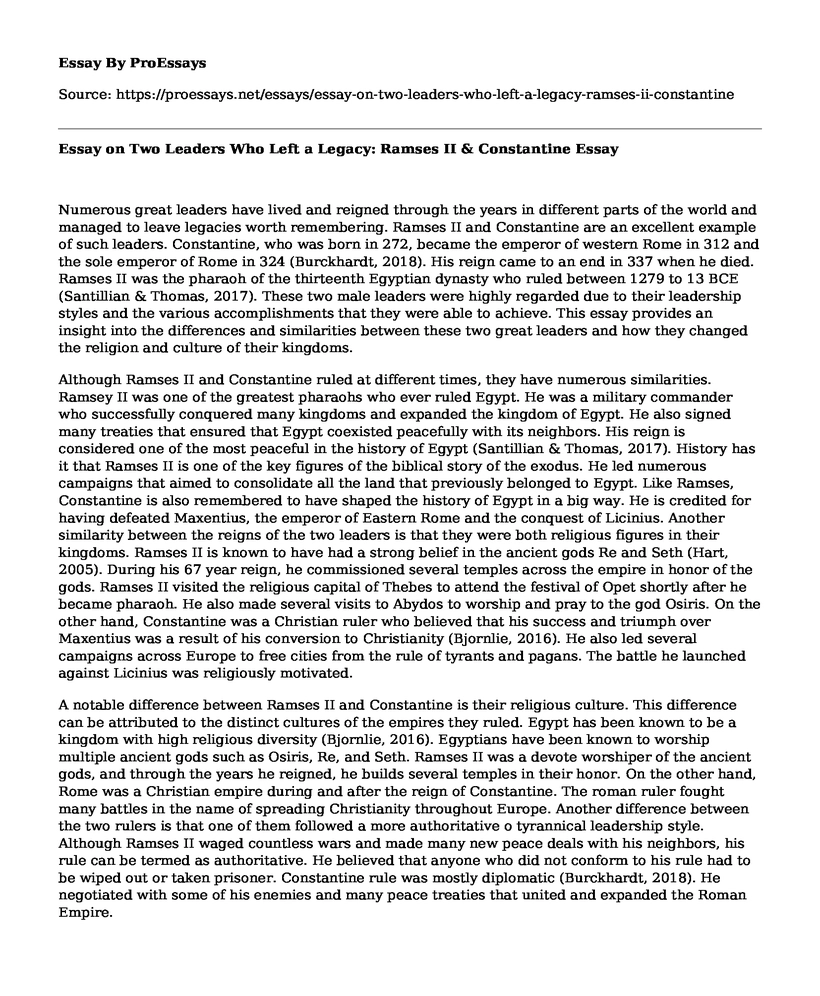Numerous great leaders have lived and reigned through the years in different parts of the world and managed to leave legacies worth remembering. Ramses II and Constantine are an excellent example of such leaders. Constantine, who was born in 272, became the emperor of western Rome in 312 and the sole emperor of Rome in 324 (Burckhardt, 2018). His reign came to an end in 337 when he died. Ramses II was the pharaoh of the thirteenth Egyptian dynasty who ruled between 1279 to 13 BCE (Santillian & Thomas, 2017). These two male leaders were highly regarded due to their leadership styles and the various accomplishments that they were able to achieve. This essay provides an insight into the differences and similarities between these two great leaders and how they changed the religion and culture of their kingdoms.
Although Ramses II and Constantine ruled at different times, they have numerous similarities. Ramsey II was one of the greatest pharaohs who ever ruled Egypt. He was a military commander who successfully conquered many kingdoms and expanded the kingdom of Egypt. He also signed many treaties that ensured that Egypt coexisted peacefully with its neighbors. His reign is considered one of the most peaceful in the history of Egypt (Santillian & Thomas, 2017). History has it that Ramses II is one of the key figures of the biblical story of the exodus. He led numerous campaigns that aimed to consolidate all the land that previously belonged to Egypt. Like Ramses, Constantine is also remembered to have shaped the history of Egypt in a big way. He is credited for having defeated Maxentius, the emperor of Eastern Rome and the conquest of Licinius. Another similarity between the reigns of the two leaders is that they were both religious figures in their kingdoms. Ramses II is known to have had a strong belief in the ancient gods Re and Seth (Hart, 2005). During his 67 year reign, he commissioned several temples across the empire in honor of the gods. Ramses II visited the religious capital of Thebes to attend the festival of Opet shortly after he became pharaoh. He also made several visits to Abydos to worship and pray to the god Osiris. On the other hand, Constantine was a Christian ruler who believed that his success and triumph over Maxentius was a result of his conversion to Christianity (Bjornlie, 2016). He also led several campaigns across Europe to free cities from the rule of tyrants and pagans. The battle he launched against Licinius was religiously motivated.
A notable difference between Ramses II and Constantine is their religious culture. This difference can be attributed to the distinct cultures of the empires they ruled. Egypt has been known to be a kingdom with high religious diversity (Bjornlie, 2016). Egyptians have been known to worship multiple ancient gods such as Osiris, Re, and Seth. Ramses II was a devote worshiper of the ancient gods, and through the years he reigned, he builds several temples in their honor. On the other hand, Rome was a Christian empire during and after the reign of Constantine. The roman ruler fought many battles in the name of spreading Christianity throughout Europe. Another difference between the two rulers is that one of them followed a more authoritative o tyrannical leadership style. Although Ramses II waged countless wars and made many new peace deals with his neighbors, his rule can be termed as authoritative. He believed that anyone who did not conform to his rule had to be wiped out or taken prisoner. Constantine rule was mostly diplomatic (Burckhardt, 2018). He negotiated with some of his enemies and many peace treaties that united and expanded the Roman Empire.
The culture of the dynasty that was ruled by Ramses II differs in several ways from that of the Roman Empire of Constantine's time. Firstly, the Egyptian empire worshiped many ancient gods, while the Roman Empire was mostly Christian. Secondly, polygamy was widely practiced in ancient Egypt while in the Roman Empire, only a few men were polygamous. Generally, the family was held in higher regard in the Roman Empire due to the Christian values while the Egyptians did not put more emphasis on family/matrimonial values.
Conclusion
In conclusion, many lessons can be learned from the comparison of the two leaders. Firstly, their fall from grace teaches us that leaders should understand that they serve the people and not just themselves. They should be able to make their followers believe that their course and beliefs are meant for the greater good and not to serve their personal interests. It can also be learned that ambition should be controlled carefully. The ambition of the two rulers to expand their empires eventually contributed to their fall.
References
Bjornlie, M. S. (Ed.). (2016). The Life and Legacy of Constantine: Traditions Through the Ages. Routledge.
Burckhardt, J. (2018). The Age of Constantine the Great (1949). Routledge.
Hart, G. (2005). The Routledge dictionary of Egyptian gods and goddesses. Routledge.
Santillian, B., & Thomas, S. (2017). Ramses II: The Most Powerful Pharaoh of Ancient Egypt. The Rosen Publishing Group, Inc.
Cite this page
Essay on Two Leaders Who Left a Legacy: Ramses II & Constantine. (2023, Jan 29). Retrieved from https://proessays.net/essays/essay-on-two-leaders-who-left-a-legacy-ramses-ii-constantine
If you are the original author of this essay and no longer wish to have it published on the ProEssays website, please click below to request its removal:
- The Dark Satanic Mills Essay
- Research Paper on Social and Organizational Issues in Healthcare
- Critical Evaluation of the Human Resource Strategy of Goody's LLC
- Paper Example on September 11th Attack
- Cognition and Decision Making - Essay Sample
- The Varied Mythology of Ancient Egypt: 4000 BCE - Essay Sample
- Essay Example on Mahatma Gandhi: A Rebellious Life of Political Success







